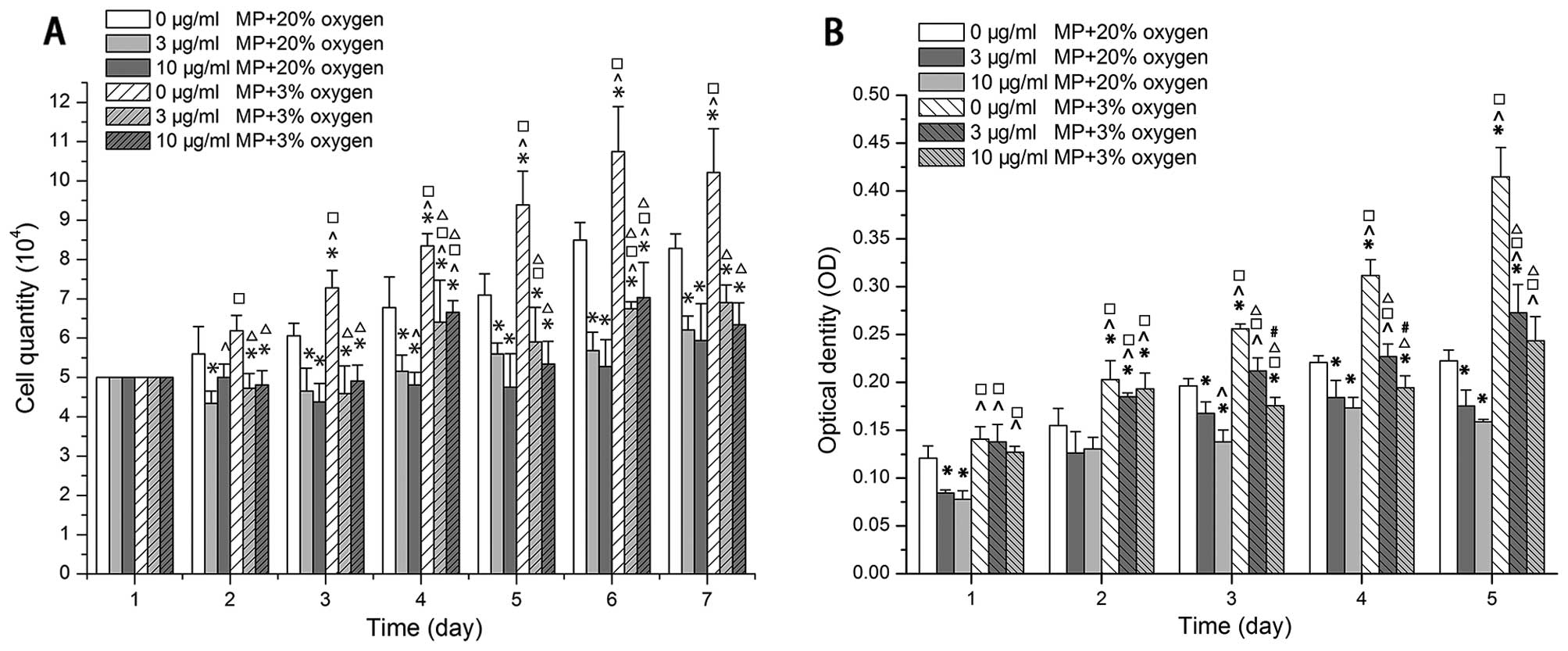|
1
|
Hausmann ON: Post-traumatic inflammation
following spinal cord injury. Spinal Cord. 41:369–378. 2003.
View Article : Google Scholar : PubMed/NCBI
|
|
2
|
Jones TB, McDaniel EE and Popovich PG:
Inflammatory-mediated injury and repair in the traumatically
injured spinal cord. Curr Pharm Des. 11:1223–1236. 2005. View Article : Google Scholar : PubMed/NCBI
|
|
3
|
Majmundar AJ, Wong WJ and Simon MC:
Hypoxia-inducible factors and the response to hypoxic stress. Mol
Cell. 40:294–309. 2010. View Article : Google Scholar : PubMed/NCBI
|
|
4
|
Horie N, So K, Moriya T, et al: Effects of
oxygen concentration on the proliferation and differentiation of
mouse neural stem cells in vitro. Cell Mol Neurobiol. 28:833–845.
2008. View Article : Google Scholar : PubMed/NCBI
|
|
5
|
Zhu LL, Wu LY, Yew DT and Fan M: Effects
of hypoxia on the proliferation and differentiation of NSCs. Mol
Neurobiol. 31:231–242. 2005. View Article : Google Scholar : PubMed/NCBI
|
|
6
|
Chen X, Tian Y, Yao L, Zhang J and Liu Y:
Hypoxia stimulates proliferation of rat neural stem cells with
influence on the expression of cyclin D1 and c-Jun N-terminal
protein kinase signaling pathway in vitro. Neuroscience.
165:705–714. 2010. View Article : Google Scholar : PubMed/NCBI
|
|
7
|
Schröter A, Lustenberger RM, Obermair FJ
and Thallmair M: High-dose corticosteroids after spinal cord injury
reduce neural progenitor cell proliferation. Neuroscience.
161:753–763. 2009.PubMed/NCBI
|
|
8
|
Li SY, Wang P, Tang Y, Huang L, Wu YF and
Shen HY: Analysis of methylprednisolone-induced inhibition on the
proliferation of neural progenitor cells in vitro by gene
expression profiling. Neurosci Lett. 526:154–159. 2012. View Article : Google Scholar : PubMed/NCBI
|
|
9
|
Gaber T, Schellmann S, Erekul KB, et al:
Macrophage migration inhibitory factor counterregulates
dexamethasone-mediated suppression of hypoxia-inducible factor-1
alpha function and differentially influences human CD4+
T cell proliferation under hypoxia. J Immunol. 186:764–774. 2011.
View Article : Google Scholar
|
|
10
|
Alexson TO, Hitoshi S, Coles BL, Bernstein
A and van der Kooy D: Notch signaling is required to maintain all
neural stem cell populations-irrespective of spatial or temporal
niche. Dev Neurosci. 28:34–48. 2006. View Article : Google Scholar : PubMed/NCBI
|
|
11
|
Gustafsson MV, Zheng X, Pereira T, et al:
Hypoxia requires notch signaling to maintain the undifferentiated
cell state. Dev Cell. 9:617–628. 2005. View Article : Google Scholar : PubMed/NCBI
|
|
12
|
Oya S, Yoshikawa G, Takai K, et al:
Attenuation of Notch signaling promotes the differentiation of
neural progenitors into neurons in the hippocampal CA1 region after
ischemic injury. Neuroscience. 158:683–692. 2009. View Article : Google Scholar : PubMed/NCBI
|
|
13
|
Shihabuddin LS, Ray J and Gage FH: FGF-2
is sufficient to isolate progenitors found in the adult mammalian
spinal cord. Exp Neurol. 148:577–586. 1997. View Article : Google Scholar : PubMed/NCBI
|
|
14
|
Shihabuddin LS, Horner PJ, Ray J and Gage
FH: Adult spinal cord stem cells generate neurons after
transplantation in the adult dentate gyrus. J Neurosci.
20:8727–8735. 2000.PubMed/NCBI
|
|
15
|
Sergent-Tanguy S, Chagneau C, Neveu I and
Naveilhan P: Fluorescent activated cell sorting (FACS): a rapid and
reliable method to estimate the number of neurons in a mixed
population. J Neurosci Methods. 129:73–79. 2003. View Article : Google Scholar : PubMed/NCBI
|
|
16
|
Zhao T, Zhang CP, Liu ZH, et al:
Hypoxia-driven proliferation of embryonic neural stem/progenitor
cells-role of hypoxia-inducible transcription factor-1alpha. FEBS
J. 275:1824–1834. 2008. View Article : Google Scholar : PubMed/NCBI
|
|
17
|
Wagner AE, Huck G, Stiehl DP, Jelkmann W
and Hellwig-Burgel T: Dexamethasone impairs hypoxia-inducible
factor-1 function. Biochem Biophys Res Commun. 372:336–340. 2008.
View Article : Google Scholar : PubMed/NCBI
|
|
18
|
Murata K, Hattori M, Hirai N, et al: Hes1
directly controls cell proliferation through the transcriptional
repression of p27Kip1. Mol Cell Biol. 25:4262–4271. 2005.
View Article : Google Scholar : PubMed/NCBI
|
|
19
|
Kabos P, Kabosova A and Neuman T: Blocking
HES1 expression initiates GABAergic differentiation and induces the
expression of p21(CIP1/WAF1) in human neural stem cells. J Biol
Chem. 277:8763–8766. 2002. View Article : Google Scholar : PubMed/NCBI
|
|
20
|
Androutsellis-Theotokis A, Leker RR,
Soldner F, et al: Notch signalling regulates stem cell numbers in
vitro and in vivo. Nature. 442:823–826. 2006. View Article : Google Scholar : PubMed/NCBI
|
|
21
|
Wang B, Liu Y, Chi F, Zhang Y, Yang M and
Zhu X: Dexamethasone suppresses cochlear Hes1 expression after
noise exposure. Acta Otolaryngol. 133:233–238. 2013. View Article : Google Scholar : PubMed/NCBI
|
|
22
|
Mizutani K, Yoon K, Dang L, Tokunaga A and
Gaiano N: Differential Notch signalling distinguishes neural stem
cells from intermediate progenitors. Nature. 449:351–355. 2007.
View Article : Google Scholar
|
|
23
|
Grandbarbe L, Bouissac J, Rand M, Hrabé de
Angelis M, Artavanis-Tsakonas S and Mohier E: Delta-Notch signaling
controls the generation of neurons/glia from neural stem cells in a
stepwise process. Development. 130:1391–1402. 2003. View Article : Google Scholar : PubMed/NCBI
|
|
24
|
Mellodew K, Suhr R, Uwanogho DA, et al:
Nestin expression is lost in a neural stem cell line through a
mechanism involving the proteasome and Notch signalling. Brain Res.
151:13–23. 2004. View Article : Google Scholar : PubMed/NCBI
|
|
25
|
Cunningham LA, Candelario K and Li L:
Roles for HIF-1alpha in neural stem cell function and the
regenerative response to stroke. Behav Brain Res. 227:410–417.
2012. View Article : Google Scholar : PubMed/NCBI
|
|
26
|
Pistollato F, Rampazzo E, Persano L, et
al: Interaction of HIF1α and Notch signaling regulates
medulloblastoma precursor proliferation and fate. Stem Cells.
28:1918–1929. 2010.
|



















